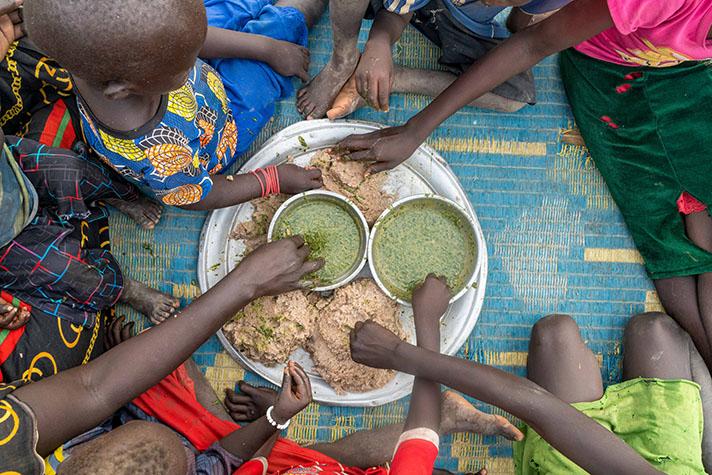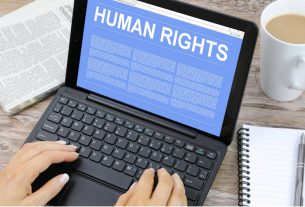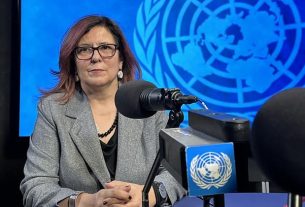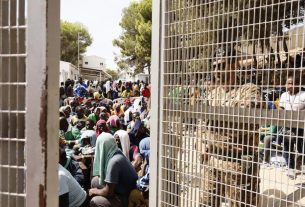Abuk Garang is in cheerful mood with a huge smile plastered across her face. Her children are in similarly high spirits and playing together outside their small house in Halbul, Aweil East. See how EU-funded food and cash assistance provided by the World Food Programme (WFP) helped her family and empowered her community.
The reason for the joy spreading through the household is the knowledge that today, they’ll be able to eat 2 full meals. Abuk, a 38-year-old farmer and mother, is preparing to head out the door to a food and cash distribution.
While it may not seem like a big deal, 2 meals at this time of the year is more or less a luxury in Abuk’s village. The village struggles with climate extremes throughout the year that severely impact food security.
“I am staying alone with my children and earn a living by cultivating on people’s farms,” she explains. “But this year there is drought that’s affecting our crops so I don’t know what harvest I will get”.
South Sudan is facing one of its hungriest years since independence in 2011, with some 7.76 million people in crisis.
Food assistance remains a lifeline for many families across the country. The assistance is made possible thanks to support from generous donors like the European Union.
Abouk’s crops failed and she found herself without the resources to feed herself and her family. This year, she was registered to receive food and cash assistance throughout the lean season in Aweil for the first time.
More and more families are finding themselves in the same positions and require humanitarian assistance. The toxic combination of conflict, the climate crisis, and soaring food costs are driving them toward hunger.
In Northern Bahr el Ghazal, the peak of the lean season falls around July and August when heavy rains can damage roads and cut-off entire communities or supply routes.
Often during this time, the cost of staple foods such as sorghum, maize and lentils is high – even more so this year, after fighting in neighbouring Sudan caused major disruptions to cross-border trade.
During the lean season, many families have only 1 meal in a day while others may not even be able to afford that.
“In July, household food stocks are already depleted,” says Yolanda Ile, WFP’s Deputy Head of Programme in Northern Bahr el Ghazal state. “Food assistance remains a lifeline for their survival.”
Much-needed food and cash assistance
In 2023, the European Union provided €11 million in humanitarian aid to the United Nations World Food Programme (WFP).
This funding helps save lives through the lean season in South Sudan by mitigating the impact of food insecurity with supplementary food and cash assistance.
More than 3 million people have received this assistance, including over 200,000 across Northern Bahr el Ghazal. Children under 5 years old and pregnant and lactating women are also receiving life-saving nutrition assistance throughout the year.
In Halbul, Abuk lines up to receive her entitlements. First, she’s provided with cash which she can use as she wishes. Then she receives her cereals; today it’s sorghum.
Cash assistance is increasingly becoming a preferred method of humanitarian assistance. It economically empowers families, particularly women, and supports local markets and trade, which benefits the entire community.
After taking her sorghum home, Abuk heads straight to the market to buy some of her family’s favourite foods. Today she’ll make posho, locally known as asida, with korofo, a sauce made from fresh greens and groundnut paste, 2 ingredients she’ll buy from the market.
Having the freedom to buy what she needs and when she needs it has allowed Abuk to concentrate on her upcoming harvest. She can focus on salvaging what she can despite the conditions.
To support her with this, WFP has provided Abuk and her fellow community members with training on how to improve agronomic practices and implement climate smart agricultures. All this helps increase vegetable production.
“This assistance and training have really helped me a lot. Without it, life would be very difficult,” Abuk says as she calls Ngor, her first-born son, to organise plates for their meal.
“If I have a good harvest, I will support another person that needs help. I have been helped a lot and I’d like to do the same for another person.”



